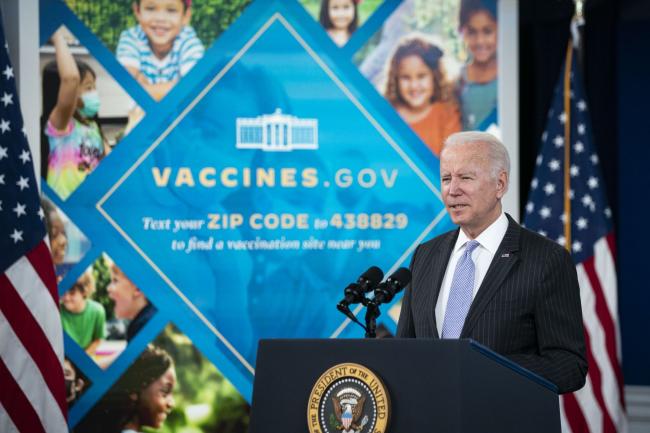(Bloomberg) -- President Joe Biden’s call for companies to enact Covid-19 vaccine or testing requirements is likely to exacerbate the labor shortage at some U.S. firms.
The Labor Department said Thursday that companies with 100 or more employees will need to have all staff vaccinated or regularly tested for Covid-19. It set a Jan. 4 deadline. Failure to comply could trigger fines of as much as $136,000. The government is seeking to make workplaces safer as it tries to stop the spread of the virus, which slowed the economy last quarter. It said the measure will increase protections for 84 million workers.
But the new requirements could also have an unwanted side-effect by spurring workers who oppose vaccinations to leave their jobs -- which would be another blow for companies already struggling to find employees.
“The mandates are probably going to push more people away than they’re going to bring back,” said Stephen Stanley, chief economist at Amherst Pierpont Securities. “We know there’s a significant number of people who don’t want to get vaccinated, and millions of people who want to work but will still be afraid of getting back because of the pandemic.”
Many of the latter group are likely in public-facing jobs, such as servers and nurses, Stanley said. Mandates “may protect them from fellow workers but it doesn’t protect them from customers” or people encountered during their commute.
‘More Comfortable’
Nearly one-quarter of out-of-work Americans cite fear of Covid-19 as a reason for not actively searching for a job, according to an Indeed Hiring Lab survey. That share has been pretty consistent since June.
Companies including Amtrak and Google (NASDAQ:GOOGL), and states like Colorado, have already implemented their own requirements. So far, the impact has been muted. About 5% of unvaccinated workers left their jobs when their employer imposed a vaccine mandate, according to an October survey from the Kaiser Family Foundation. In New York, where the police union threatened 10,000 officers would leave if a mandate were enforced, only about three dozen ended up handing in their badges.
Still, even small numbers could cause problems for companies in tightening labor markets. There are still roughly 5 million fewer people on U.S. payrolls compared with before the pandemic, but the pace of the return to work has slowed sharply. Fewer than 200,000 workers were added in September, the lowest number this year. Manufacturers in Boston blamed the vaccine and testing rules for exacerbating worker shortages, and employers nationwide are worried about the effect on morale and payrolls, according to the Federal Reserve’s Beige Book of corporate anecdotes.
The case for the new requirements is that they’ll enable a return to “a more normal state of affairs, where people can actually feel more comfortable working with others,” said Gregory Daco, chief U.S. economist at Oxford Economics. “If we can get to a healthier state, then we’ll get to a better economic state.”
©2021 Bloomberg L.P.

